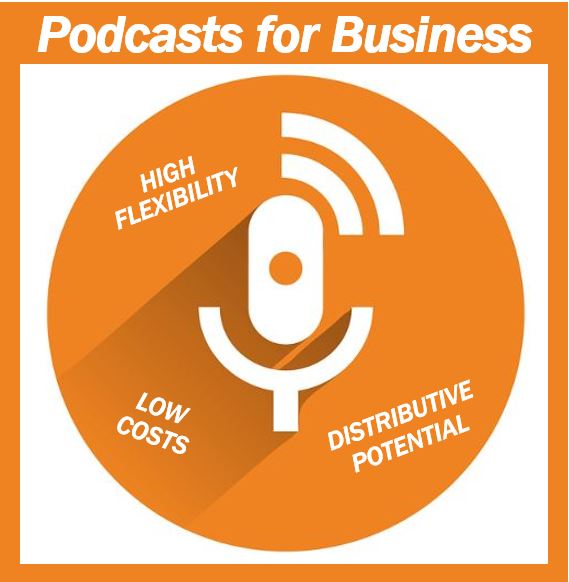 Over the past decade or so, podcasts have grown from a niche, obscure medium to an abundantly popular one. Currently, there are more than 550,000 active podcasts with more than 30 million individual episodes between them, and 51 percent of the United States population has listened to a podcast in the past. This makes them an excellent opportunity to reach your target audience and market your business.
Over the past decade or so, podcasts have grown from a niche, obscure medium to an abundantly popular one. Currently, there are more than 550,000 active podcasts with more than 30 million individual episodes between them, and 51 percent of the United States population has listened to a podcast in the past. This makes them an excellent opportunity to reach your target audience and market your business.
But what exactly does it take to start a podcast? And how can you make this a successful endeavor?
The Perks of Podcasts
First, let’s go over some of the greatest advantages of podcasts as a communicative medium for your business. That way, you can model your strategy to capitalize on these advantages:
- Low costs. Podcasts don’t require much equipment, nor do they cost money to place, making them relatively inexpensive to produce (at least compared to how much revenue they can generate).
- High flexibility. You can develop your podcast in many different ways, turning it into an interview platform, using it to instruct people, or just having casual discussions with a group. There are no limits to what you can create.
- Distributive potential. Thanks to Apple Podcasts, Spotify, and other podcast distribution networks, it’s easy to get your podcast to the masses. Adding other platforms, like paid advertising, SEO, and social media, can push that reach even further.
The Basics
So what do you need to start a successful podcast?
Let’s look at the basics:
- Professional recording (and editing) capabilities. Nobody is going to listen to a podcast that sounds like it was recorded with a $5 microphone at a train station. Even if you’re just starting out, it’s important to use a high-quality mic, preamp (if necessary), pop filter, headphones, and recording software. You’ll also want to have some way to get your work professionally edited, to polish it and make it presentable to the masses.
- An original idea. There are already hundreds of thousands of podcasts out there, and chances are, at least a few dozen of them are covering the topics you’re considering. If you want to stand out from the competition and appeal to a unique target audience, you’ll need a truly original idea. You could try to cover a brand new subject, or cover an existing subject in some new and innovative way. Either way, you’ll need some unique factor to differentiate yourself.
- The right hosts and tone. Podcasts largely rely on primary people speaking, and guiding listeners through educational or entertaining material. Your hosts need to be talented and consistent to succeed; they should be charismatic enough to be appealing to a wide audience, reliable enough to provide a consistent tone, and unique enough that they can be easily distinguished from other podcasters. Of course, they also need to be professional and articulate, so they’re easily understood.
- A path to monetization. A podcast is only going to be valuable to your organization if there’s some way to monetize it. Most podcasts are widely available for free, but there are several ways to make money from your listener base—you just have to choose the right one(s). For example, you could feature ads for unrelated products as “commercial breaks” between sections of content on your podcast, or you could offer premium episodes of your show for an extra fee. You could even have your hosts go on tour and make extra money that way. But the most common way is to use your podcast as a way to get more people to your site, referencing onsite content or other opportunities as frequently as possible (without turning people off from your brand).
Distribution, Marketing, and Support
Even if your podcast is truly astounding in terms of content and quality, it’s not going to grow if there isn’t some way for new people to discover it. Accordingly, you’ll need some kind of strategy to support, distribute, and market your podcast. For most new podcasters, that means capitalizing on as many podcast distribution networks as possible and optimizing their listings to appeal to both search engines and prospective new listeners. It may also include going out of your way to cross-market your podcast presence, paying for advertising, or working with other popular podcast hosts on more collaborative efforts.
Just because podcasts are popular doesn’t mean it’s easy to get involved. However, podcasts do represent an extraordinary opportunity to reach new people, talk about your business, and hopefully, generate a loyal following. You won’t have to invest much money at the outset, but you should be prepared to invest a considerable amount of time; even if you have a knack for podcasts, it’s going to take you dozens of hours and experimental episodes to figure out what works.
All these strategies and measures are components of online marketing, digital marketing, or Internet marketing.

